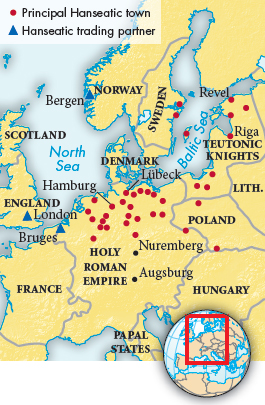Business Procedures
The economic surge of the High Middle Ages led merchants to invent new business procedures. Beginning in Italy, merchants formalized their agreements with new types of contracts, including temporary contracts for land and sea trading ventures and permanent partnerships termed compagnie (kahm-
The ventures of the German Hanseatic League illustrate these new business procedures. The Hanseatic League was a mercantile association of towns. It originated in agreements between merchants for mutual security and exclusive trading rights, and it gradually developed into agreements among towns themselves. At its height, the league included perhaps two hundred cities from Holland to Poland. From the fourteenth to the sixteenth centuries, the Hanseatic League controlled the trade of northern Europe.

The dramatic increase in trade ran into two serious difficulties in medieval Europe. First, despite investment in mining operations to increase the production of metals, the amount of gold, silver, and copper available for coins was not adequate for the increased flow of commerce. Merchants developed paper bills of exchange, in which coins or goods in one location were exchanged for a sealed letter, which could be used in place of metal coinage elsewhere. This made the long, slow, and very dangerous shipment of coins unnecessary and facilitated the expansion of credit and commerce.
The second problem was a moral and theological one. Church doctrine frowned on lending money at interest, termed usury (YOO-